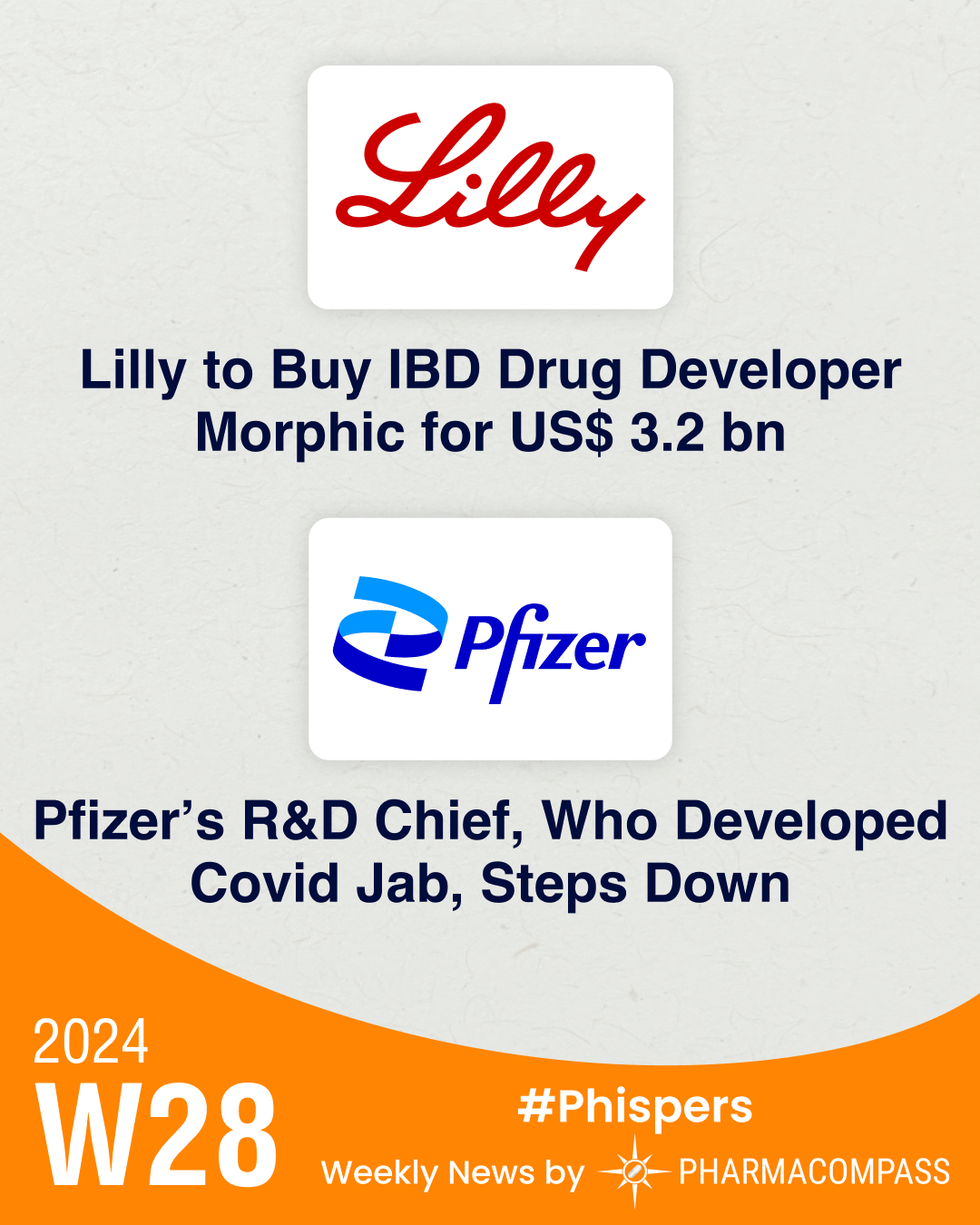
By PharmaCompass
2024-07-11
Impressions: 1,075 (Article) || 2 (Video)
This week saw Eli Lilly strike yet another deal as it announced the acquisition of Morphic Holding for about US$ 3.2 billion, thereby bolstering its position in the market for inflammatory bowel disease (IBD) drugs.
Pfizer announced that its Chief Scientific Officer (CSO) Mikael Dolsten, a key figure behind the development of its Covid vaccine Comirnaty, will be stepping down after over 15 years with the drugmaker.
A study found that Lilly’s glucagon-like peptide 1 (GLP-1) drug tirzepatide, used in its diabetes and weight-loss drugs Mounjaro and Zepbound, was more effective than its rival semaglutide, used in Novo Nordisk’s Ozempic and Wegovy, at shedding extra pounds.
Another study found that GLP-1 drugs may have a role in preventing cancer. Meanwhile, a study undertaken by an American pharmacy found that only one in four patients in the US who were prescribed Novo Nordisk’s Wegovy or Ozempic for weight loss were still taking the popular medications after two years.
Spain’s Grifols said it has received a takeover offer from its founding family and Brookfield Corporation to go private. The deal could potentially be worth about US$ 6 billion.
Roche scrapped a trial testing its new immunotherapy tiragolumab in non-small cell lung cancer (NSCLC) patients after it failed to significantly improve survival more than a Keytruda-chemo combination. The Swiss drugmaker is reintroducing its eye therapy Susvimo in the US after voluntarily recalling it in October 2022.
UniQure released promising 24-month data for its investigational gene therapy that showed AMT-130 significantly decreased disease progression in patients with Huntington’s disease.
Lilly to acquire bowel disease drug developer Morphic for US$ 3.2 billion
Eli Lilly said it is acquiring Massachusetts-based Morphic Holding for approximately US$ 3.2 billion in cash, bolstering its presence in the US$ 26.65 billion IBD market. The Indiana drugmaker gains an investigational oral IBD therapy — MORF-057 — which will offer a more convenient dosing option compared to current injectable drugs, including Lilly’s Omvoh (mirikizumab). MORF-057 is being tested in three mid-stage studies to treat ulcerative colitis and Crohn’s disease, the two conditions that fall under IBD. Lilly sees the IBD space as a way to diversify beyond obesity.
Pfizer’s R&D chief Mikael Dolsten, architect behind Comirnaty, to step down
Pfizer’s CSO Mikael Dolsten is stepping down after a 15-year career at the New York drugmaker. Under Dolsten, Pfizer won approvals for over 35 drugs and vaccines including for blockbuster drugs like its blood thinner Eliquis (apixaban), breast cancer med Ibrance (palbociclib), and heart disease treatment Vyndaqel (tafamidis meglumine). However, what stands out most is its Covid vaccine Comirnaty under Dolsten’s tenure. Jointly developed with BioNTech, the mRNA vaccine became the first Covid shot approved in the US. Comirnaty catapulted Pfizer’s sales to over US$ 100 billion in 2022.
Lilly’s Mounjaro outperforms Novo’s Ozempic in weight loss study
Electronic records of over 18,000 obese or overweight US adults showed Lilly’s tirzepatide helped patients shed more weight than its rival Novo’s semaglutide, with the effect increasing over time. The study found that 82 percent of patients taking tirzepatide lost 5 percent of their starting body weight compared to 67 percent of those taking semaglutide, after a year. Novo pointed out that the analysis did not include its weight-loss drug Wegovy and said a head-to-head clinical trial is the best way to compare the two weight-loss drugs. Such a trial on tirzepatide and semaglutide is yet to conclude.
GLP-1 drugs linked to lower cancer risk: Type 2 diabetes patients taking GLP-1 treatments “had a significant risk reduction” in developing 10 common types of cancers closely associated with obesity compared to those on insulin, according to a study published in JAMA Network Open. The study concluded that the “findings provide preliminary evidence of the potential benefit” of GLP-1 drugs for cancer prevention in high-risk populations.
Few continue weight loss drugs after two years: Only one in four patients in the US who were prescribed Novo Nordisk’s Wegovy or Ozempic for weight loss were still taking the popular medications two years later, a Reuters report said. The analysis, undertaken by an American pharmacy, does not include details about why patients quit. Another news report said only about 15 percent of people who began taking GLP-1 drugs such as Wegovy stuck with them after two years.
Grifols gets US$ 6 billion takeover offer from founding family, Brookfield
Spanish multinational pharmaceutical company Grifols said it is evaluating a takeover offer from its founding family and the Canadian investment management company Brookfield that would delist the company from the Spanish and Nasdaq stock markets. Based on the company’s current market value, the deal is potentially worth around US$ 6 billion. The Grifols family holds a stake of about 30 percent, which they don’t plan to sell. Brookfield is mulling investing over € 5 billion (US$ 5.41 billion), part of which will be to refinance and restructure the company’s debt. The beleaguered drugmaker was rocked by allegations of fraud earlier this year over manipulation of its debt.
FDA rejects Novo’s weekly insulin, seeks manufacturing information
FDA has issued Novo Nordisk a complete response letter (CRL), declining to approve the Danish drugmaker’s weekly insulin Awiqli (insulin icodec). The agency has requested information related to the manufacturing process and the type 1 diabetes indication before the review of the application can be completed, a company statement said. In May, an FDA panel had voted seven to four against the benefits of Awiqli outweighing its risks.
Roche scraps trial after new immunotherapy loses to Keytruda-chemo combo
Roche is putting an end to a trial testing its new immunotherapy tiragolumab in non-small cell lung cancer (NSCLC) patients. Tiragolumab is part of a new class of drugs called anti-TIGIT antibodies. The study involving 524 patients with NSCLC tested tiragolumab in combination with Roche’s Tecentriq (atezolizumab) in the first line setting. It failed to best Merck’s Keytruda (pembrolizumab) plus chemotherapy as a first line of treatment in the phase 2/3 study.
Meanwhile, Roche is reintroducing Susvimo (ranibizumab injection) in the US after voluntarily recalling it in October 2022. The implant used to treat patients with neovascular age-related macular degeneration (wet AMD) requires a one-time surgery to be inserted into the eye.
UniQure posts strong data on gene therapy for Huntington’s disease
UniQure released promising 24-month data for its investigational gene therapy that showed AMT-130 significantly decreased disease progression in patients with Huntington’s disease. The early-mid stage data showed that among 29 US and European patients, those given the higher dose showed an 80 percent reduction of the neurodegenerative disease progressing, while those given the lower dose saw a 30 percent reduction of the same.
The PharmaCompass Newsletter – Sign Up, Stay Ahead
Feedback, help us to improve. Click here
Image Credit : Phisper Infographic by PharmaCompass license under CC BY 2.0
“ The article is based on the information available in public and which the author believes to be true. The author is not disseminating any information, which the author believes or knows, is confidential or in conflict with the privacy of any person. The views expressed or information supplied through this article is mere opinion and observation of the author. The author does not intend to defame, insult or, cause loss or damage to anyone, in any manner, through this article.”







